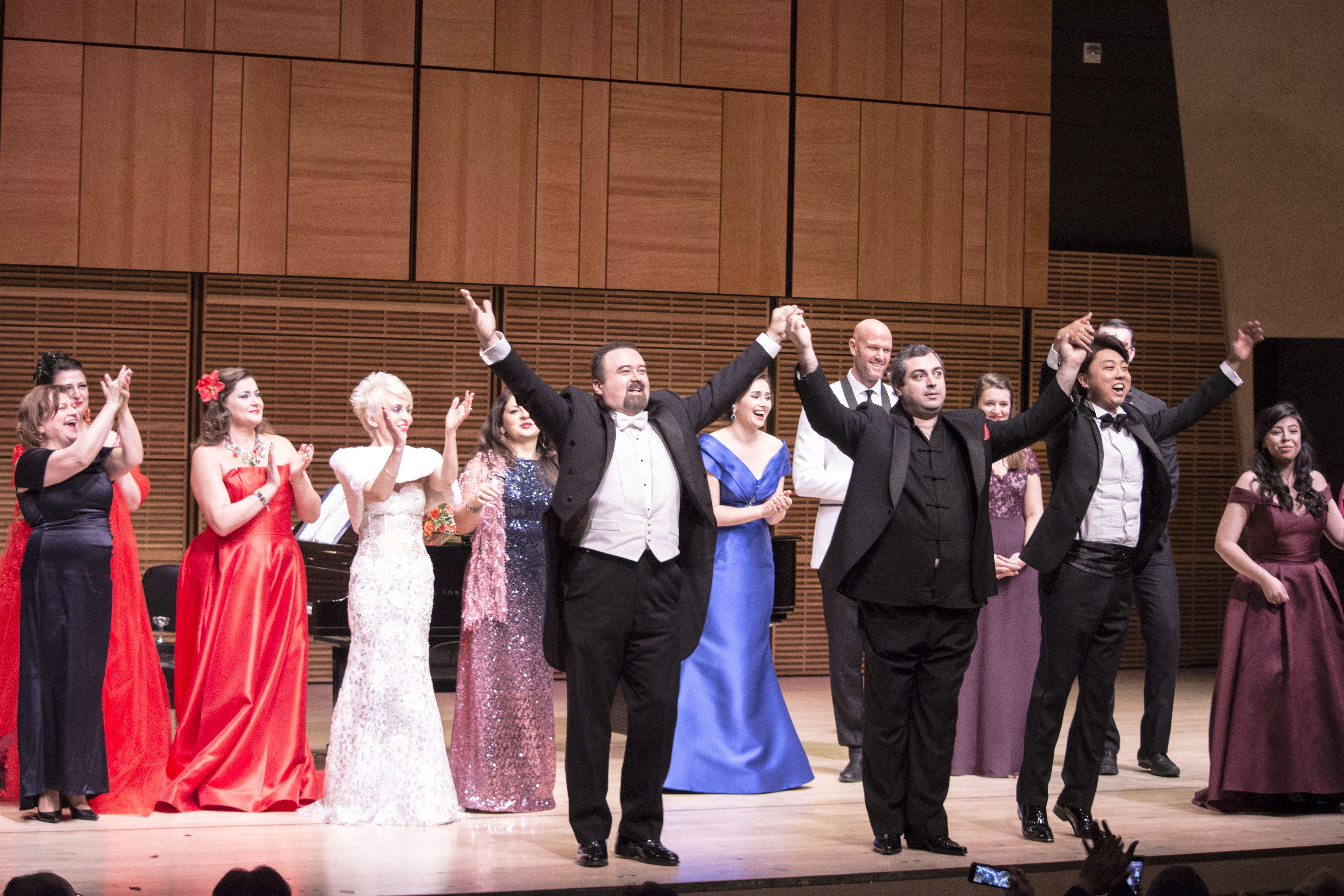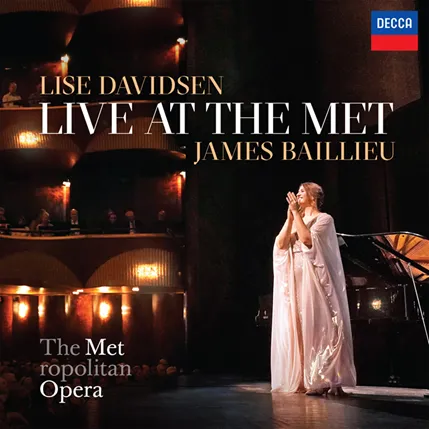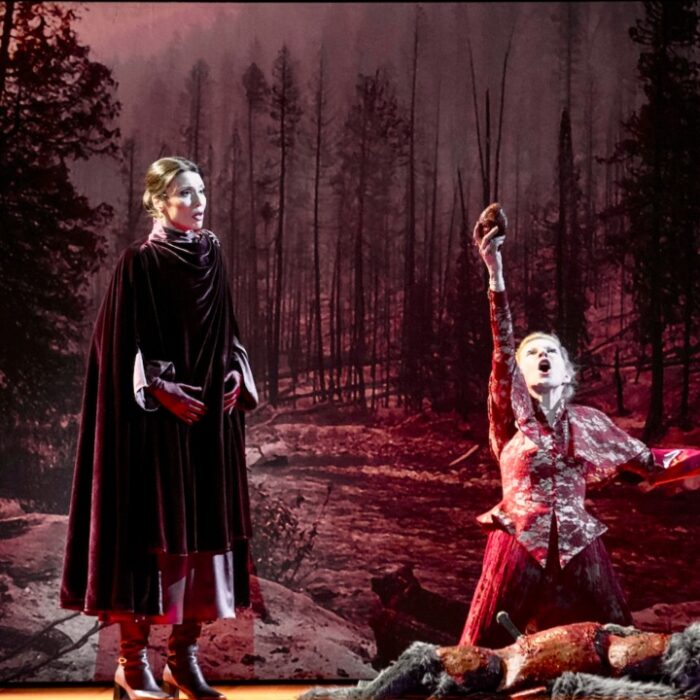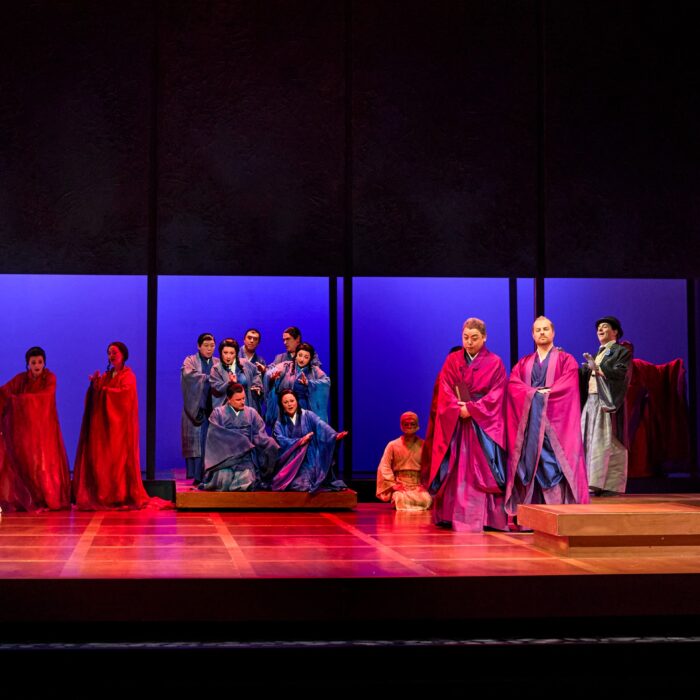
Talents of the World International Music 2018 Festival Review: Christmas Ball
Company Closes Festival with Intoxicating Christmas Concert
By Logan MartellOn Dec. 23, 2018, Talents of the World brought their first International Music Festival to a stunning conclusion with the company’s Christmas Ball. The night saw a wide-ranging program of opera, operetta, and Christmas songs, and from start to finish there remained a sense of celebration which added much to the showcase of artistry.
To Health!
Opening the concert was baritone and Talents of the World’s President, David Gvinianidze, singing “Prince Orlofsky’s Toast,” from Strauss’ “Die Fledermaus.” Walking onstage with a champagne glass in hand, Gvinianidze toasted to the audience and the company’s artists as they joined him on the stage. His rich baritone made a humorous contrast to the gracious yet aggressive lyrics normally delivered by a mezzo-soprano.
While most of the company’s artists performed during the concerts of the previous two nights, this night’s concert saw a number of new faces and voices. Among these was soprano Anni Kolkhida, who sang Sylvia’s aria “Heia, Heia,” from Kalman’s “Die Csardasfurstin.” Her sustained opening held a beckoning quality, made all the more compelling by her ability to expand her voice to a great fullness. The accompaniment, played by Victoria Ulanovskaya, shifted to a rapid section full of exotic chromaticism, which Kolkhida sang through spiritedly. The catchy Eastern European rhythm had the audience clapping along during instrumental sections before Kolkhida ended the number with a triumphantly-held final repetition on the word “brava!”
Following this was tenor WooYoung Yoon with “Ah! Mes Amis, Quel Jour de Fete!” from Donizetti’s “La Fille du Regiment.” Yoon’s rendition brought the same captivating power as he did in the previous night’s tenor concert, filling the air of the larger Zankel Hall. One change saw Yoon display his control of dynamic at the end of the first stanza, as he sustained the word “veux” he softened his delivery before taking it back to its full power.
From Rossini’s “La Cenerentola” was the aria “Nacqui All’Affanno… Non Piu Mesta,” sung by mezzo-soprano Megan Moore. She displayed elegant vocal gymnastics early on, set to the phrase “In a sudden flash my fate has changed,” and the following measures with coloratura fit for any joyous ball. After such a lovely introduction to her voice, I couldn’t help but wonder where she, like Cinderella, must have been hiding during the Prima Donnas concert on Friday.
Another introduction came from bass William Meinert, who sang “Kak Vo Gorode Bylo Vo Kazani,” from Mussorgsky’s “Boris Godunov.” Giving an account of Varlaam’s deeds in battle, Meinert’s rendition was not only vocally powerful, but had sharp timing and speed to match his strength. He was joined by soprano Olga Lisovskaya for the duet “Lo Conosco,” from Pergolesi’s “La Serva Padrona.” This duet saw Lisovskaya, with great allure, strive for the affections of the unyielding Meinert. Their heated exchanges were delightful to watch, and Meinert’s smooth shift to the lower reaches of his register was finely highlighted by the lower melody played by Alexandra Naumenko. This comic number ended with a stolen kiss from Lisovskaya and the cheerful applause of the audience.
A Triumphant Return
Despite his illness causing him to sit out Saturday night’s concert, tenor Arsen Soghomonyan returned to the stage with great determination to sing Lara’s classic song “Granada.” Ulanovskaya’s accompaniment gorgeously set the scene, with an underlying somberness to add dramatic depth. Soghomonyan rendition was highly passionate, and the two closely-occurring vocal climaxes which end the verse were given more than sufficient power. His rapturous stroll through the imagery saw him directing the lines first at Ulanovskaya, then at the front rows of the audience. While he gave his finish a triumphant power, he did not sustain it to its full length, understandably choosing not to strain his voice after just getting it back that day.
Darkening the skies was Ruslana Koval, who returned to give the Queen of the Night’s aria “Der Holle Rache,” from Mozart’s “Die Zauberflote.” Her delivery carried the same haughty grace she used to great effect on Friday night’s Prima Donnas concert, with her voice more than capable of filling the larger room. After Koval’s meteor shower of high Fs, bass Zachary James took to the stage to sing “Stars,” from Schonberg’s “Les Miserables.” Given Meinert’s 6’8 stature, I was surprised to see another bass of nearly equal build; I was even more surprised by James’ princely diction. For its weight and clarity, James’ voice leaves a strong impression; there were two small instances in the verse where he stumbled with quicker words, such as “multitudes,” and the two rapid fricatives at the end of the phrase “if you fall as Lucifer fell.” Despite this, James’ delivery was not just passionate but righteous; and his final climax soared higher than the song’s usual ending, and into the higher reaches of the baritone range.
Christmas Carols
Among the Christmas songs heard this evening were “I’m Dreaming of a White Christmas,” by Irving Berlin; “Silent Night,” by Franz-Xaver Gruber; and “Oh Holy Night,” by Adolphe Adam. The first was sung by tenor Raul Melo and bass Zachary James, the latter using his charming bass to support the imagery evoked by Melo. They harmonized well and James gave a pleasingly soft finish to the song. Singing “Silent Night” were sopranos Anna Kolkhida and Shaina Martinez, and mezzo-soprano Megan Moore. Kolkhida opened with her lovely, classic soprano, though consonants of words such as “tender” were softened. After joining her in singing, the sopranos took hands, with Moore adding texture and Martinez harmonizing beautifully. Finally, “Oh Holy Night” was performed by Kolkhida, Martinez, Melo, and Yoon, with the tenors joining in on the second verse. This pious number was capped off with a beautiful harmony between the high male and female voices.
Waltzing the Night Away
As the program reached its final handful of songs, the spirits of the company’s artists showed little sign of slowing down. A musical and comedic highlight came with Koval and Soghomonyan singing “Lippen Schweigen,” from Lehar’s operetta “The Merry Widow.” Soghomonyan’s more elegant tones made a fine match for the growing stream of ornaments Koval sang. The two began a slow, romantic dance, and as Arsen’s face circled away from the audience, he brought forth laughter by giving them the smallest of smiles, undoubtedly happy with the lovely lady in his arms.
The next waltz was Shamo’s “Dniprovsky Vals,” sung by soprano Ludmila Fesenko. The light timber of her voice was highly at ease with the dancing rhythm, making her electric ornaments all the more shocking. Fesenko displayed great physical support, and the ability to soar about her whistle register and bring forth many colors from the absolute highest reaches of the human voice, While there were many moments of humor during the night’s performance, Jenni Bank’s rendition of “I am Easily Assimilated” from Bernstein’s “Candide” was funny throughout. Adopting a thick, Eastern European accent, Bank exuded an infectious confidence in her mess of ambiguous ethnic identities.
One Last Drink
Bringing the ball to a close was the classic brindisi “Libiamo ne’ lieti calici,” from Verdi’s “La Traviata.” All the artists returned on stage. Yoon opened the number, followed by Melo, with both directing their attention to Tamar Iveri. This number saw three pairs of Alfredos and Violettas: Yoon with Koval, Gvinianidze with Iveri, and Melo with Kolkhida; the pairs danced as the remaining artists supplied the joyful chorus. Their tutti conclusion was strong and effervescent, making for an intoxicating end to the company’s Christmas Ball.
The last three evenings have seen much from the artists of Talents of the World; all three nights featured number-heavy programs that drew not only on conventionally-known works, but lesser-known gems of operetta, Neapolitan music, and more. Through this wide array, the artists brought flexibility, passion, and the capacity for fun or drama that makes an aria much more than just hitting the right notes. Given the success of their first International Music Festival, audiences have much to look forward to as the company continues to grow in its mission of being a globe-spanning promoter of the performing arts.


